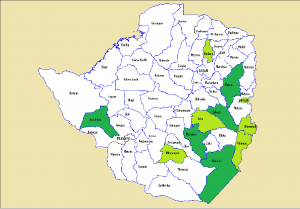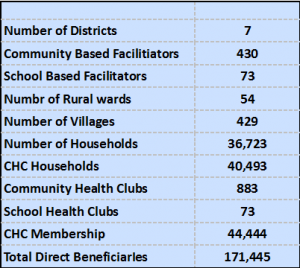Name of Organization: Africa AHEAD – Zimbabwe
Name and Contact of Representation of Organization:
Country Director: Regis Matimati:
0773038700; regis@africaahead.com
Date of Establishment: 1995; Registered as Trust in 2001
Date and Number of Registration as PVO: 19/2014
Address : 1 Thurso Avenue, Eastlea, Harare. Zimbabwe
Main Program areas :
- WASH Software (innovators of the Community Health Club Approach; PHAST Training: community mobilization, PHHE, School Health and Hygiene Promotion; Training of Trainers, WASH promotion toolkits and training manuals);
- WASH Hardware: borehole rehabilitation, upgrading family wells, school sanitation household sanitation.
- Preventative Health Promotion: HIV, TB, Malaria, Bilharzia, H1N1, Measles, etc.
- Food security & nutrition: starting Food, Agriculture and Nutrition gardens, training material, Herb growing and use of medicinal herbs
- Monitoring and Evaluation: operational research – both community-based household inventories and organization-directed/led, using state of the art mobile researchers
Africa AHEAD’s Program Experience:
Pioneer of the Community Health Club Model:
The Community Health Club (CHC) Approach, fist pioneered by ZimAHEAD in the Manicaland Province in the late 1990’s, is one of the most effective Participatory Health and Hygiene Education (PHHE) approaches currently being utilized in WASH programs. The CHC Approach is a structured program that utilizes health and hygiene promotion as an entry point to holistic development. By combining time-tested PHHE activities and Africa AHEAD’s specially designed IEC materials with the structure of weekly health promotion sessions with a dedicated group of ‘learners’ (Community Health Clubs), this approach stimulates sustainable behavior change through social pressure to conform that alters community WASH norms and values. This ‘Common-Unity’ helps to establish a culture of health that evidence has shown is sustained over time and is leveraged beyond the immediate goals of WASH programs. In this way, the CHC Approach utilizes WASH promotion as an entry point to a process of development that involves a series of stages.
Community Mobilisation:
The health club provides the community structure, acting as a vehicle for a sequence of development initiatives, each stage building upon the successes and lessons learned from the previous. In a typical program, the first stage of any project is health and hygiene promotion through CHCs, which is followed by water and sanitation infrastructure provision (with little to no subsidy). The third stage is comprised of income generation projects, which are self-identified by club members themselves, followed in the fourth year by social support programs.
Water and Sanitation:
As the demand for improved water and sanitation facilities increases through participation in a CHC, Africa AHEAD can utilize its years of in-house knowledge and technical expertise in the construction of household and community water points (improved family wells, bush pumps, etc.) and sanitation (Blair VIP) infrastructure. As the provision of infrastructure is related to the demand created through effective health promotion, we are also able to install and manage hardware for water and sanitation projects. Where Africa AHEAD has already built the necessary trust within communities, this trust can be leveraged to ensure the sustainability of this infrastructure over time.
Income Generation:
Africa AHEAD also has experience in initiating and supporting a variety of Income Generation activities, including bee-keeping, water resource management, food security gardens, soap making and other community-oriented income generation projects. This support includes both software (training of club members to increase capacity on financial and program management) and hardware (technical expertise, linkages with markets, liaising with local government and business, etc.) components of income generation. Income generation and financial management skills will be an important aspect of any livelihoods program as the sustainability of water and sanitation resources should be the primary focus of the program and resources will be required to sustain this infrastructure over time. By combining effective health promotion and community mobilization techniques with effective income generation programs, this can be achieved.
Food Security:
ZimAHEAD has implemented food security projects in schools and communities in rural, peri-urban and urban areas in Manicaland (Buhera and Chipinge) and Masvingo (Chiredzi). Beyond our standard PHHE through CHCs, Africa AHEAD is also working under an EU Livelihoods program. Since the beginning of this program (2008), over 100 CHCs have completed the PHHE sessions and transitioned into a livelihoods project under the structure of Africa AHEAD’s Food, Agriculture and Nutrition (FAN) Clubs program. Participating members in FAN Clubs expand upon their knowledge base by learning the theory of balanced diets/nutrition and perma-culture/organic farming techniques. These theoretical sessions are complemented by practical action in community (learning) gardens and household gardens. Approximately 10,000 members are currently participating in a FAN Club and are preparing to complete the module in the coming months.
Research monitoring and evaluation: Africa AHEAD also has experience in the Mobile Researcher platform for monitoring and evaluation. This recently developed research tool marries the power and reach of cellular phones with that of the internet enabling instant data capture via cellular phones sent to a centralized database.
M&E is an integral part of any successful WASH program and should be considered at the very outset of any new program. Africa AHEAD has had years of experience in designing and implementing simple to use, but valid monitoring and evaluation tools, most importantly the Household Inventory (hygiene knowledge and behaviors) for CHCs. As Zimbabwe is still a fragile state, community-based surveillance of priority illnesses and diseases will play an ever increasing role in accurate monitoring of public health emergencies. This livelihoods program could therefore also further increase the capacity of communities as first-line public health practitioners, tasked with providing weekly surveillance data on priority illnesses/diseases. With linkages already forged between communities and clinics that serve them, this type of surveillance system could have an enormous positive impact in program areas.
Africa AHEAD continues to play its part as a leading indigenous organisation attempting to ground the WASH sector by disseminating the results of operational research of best development practice and presents papers regularly at both national and international fora.
Areas of Expertise to Offer:
Africa AHEAD in Zimbabwe can offer the following expertise:
- Project design and feasibility
- Base line survey and needs identification
- Start up and running of School and Community Health Clubs
- Start up and running of FAN clubs (Food, Agriculture, Nutrition)
- Income generating projects (bee keeping, soap making, paper making)
- Development of new participatory training material and manuals
- Identification and training of facilitators
- Provision of CHC toolkits and training materials
- Liaising with local government, health practitioners, and civil society
- Design and implementation of monitoring and evaluation
- Construction of upgraded family well and borehole rehabilitation
- Construction of sanitation facilities for community and schools
- training of builders, and community based management by WATSAN committees
- Routine management of CHC/FAN Club activities
- Measurement of hygiene behavior change and community monitoring
- Writing of papers and presentations for international for a
Project Areas:
-
Manicaland :
- Makoni: 1995-2022
- Buhera: 2006-2010
- Chipinge: 2006-2022
- Mutare Urban: 2008-2009
- Chimanimani 2012-2022
-
Masvingo:
- Gutu: 1999-2001 & 2011-2022
- Chiredzi: 2008-2022
-
Midlands:
- Mberengwa (2011-2013) (two years)
-
Masvingo
- Masvingo Rural: 2011-2013
- Chiredzi: 2010-2022
- Mwenezi: 2020-2022
-
Matebeleland North
- Tsholotsho:1999-2001 (3 years)
Approximately number of beneficiaries:
2008- 2010: 15,000 members of CHCs (both school and community) and FAN Clubs (described below). 75,000 direct beneficiaries of all CHC/FAN Clubs currently implemented by Zim AHEAD.
2011-2015: 44,444 members in 956 CHCs/SCHs with an estimated 171,445 direct beneficiaries.
2016 -2022:
Funding Partners
EC/EU sub grantee of ACFUSAID/ OFDA: direct
EC/EU Sub-grantee of Mercy Corps
USAID/OFDA: Sub-grant with Oxfam GB
New Zealand Aid: direct beneficiary
Christian Community Partnership Trust (CCPT): direct beneficiary
UNICEF: direct beneficiary
DANIDA: direct
DFID: direct
New Zealand Aid: direct
USAID/OFDA: Sub-grantee of Oxfam GB
UK Lottery: sub grantee of Mercy Corps/
FAO
LEAD/USAID
Care International
UNICEF
WaterAid
Oak Foundation
Number of staff employed by Organization:
In 2022 there are 45 full time staff of which 19 are women.
Specific strengths/ capacity related to the EU Water Facility Grant:
Africa AHEAD has the good working relationship with 12 Rural District Councils and can operate effectively on the ground having established strong links with many Community Health Clubs.
We can justifiably claim to be one of the most innovative and creative local NGOs having consistently piloted technologies and mobilization strategies that work. As the originator of the Community Health Club approach we are the foremost experts in how to achieve sustainable development through these viable community structures. We can also ensure that any project that are introduced into areas where are already working will be assured strong community buy-in as well as saving project start up time as our communities are already well organized and ripe for further development.
Conclusion
We are a dedicated group of practitioners ready to be full partners with any serious international organization which values holistic development and can appreciate the benefits of using Community Health Clubs to ensure long term sustainability. We are committed to take full responsibility for our programme and require assurance that any partners entertain similar high standards of best practice.


